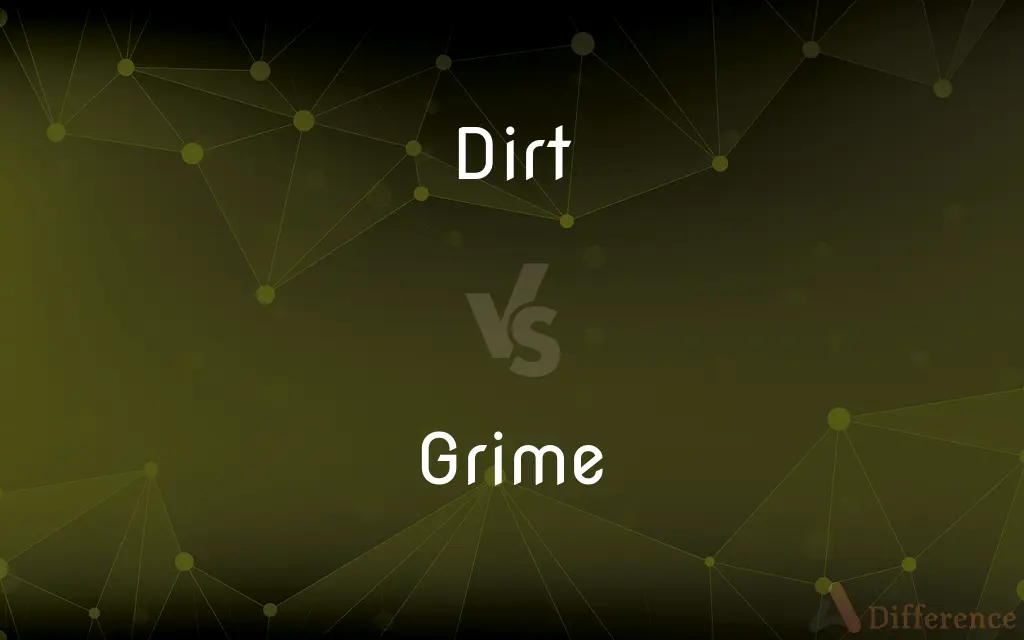Dirt vs. Grime — What's the Difference?
By Tayyaba Rehman & Urooj Arif — Updated on March 13, 2024
Dirt refers to loose soil or debris, often found on surfaces or the ground, while grime is a thick layer of dirt that clings to surfaces, often from pollution or neglect.

Difference Between Dirt and Grime
Table of Contents
ADVERTISEMENT
Key Differences
Dirt is naturally occurring, consisting of particles like soil or dust, which can be easily displaced or cleaned. It's common in outdoor environments but can be found indoors on floors, windowsills, and other surfaces. On the other hand, grime is the result of accumulated dirt and pollutants, forming a stubborn, often sticky layer. It's typically found in areas exposed to consistent handling or neglect, such as on kitchen appliances, bathroom surfaces, or industrial equipment.
While dirt can often be removed with simple cleaning methods, such as sweeping or wiping, grime usually requires more intensive cleaning efforts. This might include the use of detergents, scrubbing, or specialized cleaning solutions to break down the accumulated layers.
Dirt is part of natural processes and cycles, contributing to the nutrient content of soil and supporting plant growth. Conversely, grime is indicative of human activity and environmental pollution. Its removal is not just for aesthetic reasons but also for health, as it can harbor bacteria and other pathogens.
The perception of dirt versus grime also varies culturally and contextually. Dirt can be seen as a temporary, easily rectifiable condition, whereas grime might suggest neglect or a lack of cleanliness.
Comparison Chart
Composition
Loose soil, dust, and organic matter.
Accumulated dirt and pollutants, often sticky.
ADVERTISEMENT
Source
Natural processes, outdoor activity.
Human activity, neglect, environmental pollution.
Removal
Generally easy, with sweeping, vacuuming, or light wiping.
Requires intensive cleaning, detergents, or scrubbing.
Associated with
Natural environments, outdoor activities.
Neglect, indoor environments, pollution.
Impact on surfaces
Temporary, often easily cleaned.
Persistent, can damage or stain surfaces.
Compare with Definitions
Dirt
Loose soil or earth.
The gardener shook the dirt off the roots before potting the plant.
Grime
Deep-seated dirt ingrained on surfaces.
The old bookshelf was covered in years of grime.
Dirt
Slang: Earth or land as opposed to the sea or air.
After months at sea, the sailors longed for dirt under their feet.
Grime
An element in certain music and art scenes emphasizing raw, unpolished quality.
His music has a grime vibe that's raw and energetic.
Dirt
A substance that soils someone or something.
She wiped the dirt from her shoes.
Grime
A form of pollution that sticks to buildings and streets.
The city's monuments are discolored by grime.
Dirt
Informal: Scandalous or malicious gossip.
They love to spread dirt on celebrities.
Grime
Figuratively, something that tarnishes or sullies.
The scandal left a layer of grime on the institution's reputation.
Dirt
A derogatory term for something considered worthless.
He called the proposal dirt, unworthy of further discussion.
Grime
A representation of neglect or poor maintenance.
The grime on the windows suggested the house had been abandoned.
Dirt
Dirt is unclean matter, especially when in contact with a person's clothes, skin or possessions. In such case they are said to become dirty.
Grime
Dirt ingrained on the surface of something
The windows were thick with grime
Dirt
Earth or soil.
Grime
A genre of popular music influenced by UK garage, typically characterized by a minimal, prominent rhythm, a very low-pitched bassline, and vocals by an MC.
Dirt
A filthy or soiling substance, such as mud or dust.
Grime
Blacken or make dirty with grime
The windows were grimed like a coal miner's goggles
Dirt
Excrement.
Grime
Black dirt or soot, especially such dirt clinging to or ingrained in a surface.
Dirt
A squalid or filthy condition.
Grime
To cover with black dirt or soot; begrime.
Dirt
One that is mean, contemptible, or vile.
Grime
Dirt, grease, soot, etc. that is ingrained and difficult to remove.
Underneath all that soot, dirt and grime is the true beauty of the church in soft shades of sandstone.
Dirt
Obscene language or subject matter.
Grime
(music) A genre of urban music that emerged in London, England, in the early 2000s, primarily a development of UK garage, dancehall, and hip hop.
Dirt
Malicious or scandalous gossip.
Grime
To begrime; to cake with dirt.
Dirt
Information that embarrasses or accuses.
Grime
Foul matter; dirt, rubbed in; sullying blackness, deeply ingrained.
Dirt
Unethical behavior or practice; corruption.
Grime
To sully or soil deeply; to dirt.
Dirt
Material, such as gravel or slag, from which metal is extracted in mining.
Grime
The state of being covered with unclean things
Dirt
Soil or earth.
Grime
Make soiled, filthy, or dirty;
Don't soil your clothes when you play outside!
Dirt
A stain or spot (on clothes etc); any foreign substance that worsens appearance.
Dirt
Previously unknown facts, or the invented "facts", about a person.
The reporter uncovered the dirt on the businessman by going undercover.
Dirt
(figurative) Meanness; sordidness.
Dirt
(mining) In placer mining, earth, gravel, etc., before washing.
Dirt
Freckles
Dirt
To make foul or filthy; soil; befoul; dirty
Dirt
Any foul of filthy substance, as excrement, mud, dust, etc.; whatever, adhering to anything, renders it foul or unclean; earth; as, a wagonload of dirt.
Whose waters cast up mire and dirt.
Dirt
Meanness; sordidness.
Honors . . . thrown away upon dirt and infamy.
Dirt
In placer mining, earth, gravel, etc., before washing.
Dirt
To make foul of filthy; to dirty.
Dirt
The part of the earth's surface consisting of humus and disintegrated rock
Dirt
The state of being covered with unclean things
Dirt
Obscene terms for feces
Dirt
Disgraceful gossip about the private lives of other people
Dirt
(of roads) not leveled or drained; unsuitable for all year travel
Common Curiosities
What is the main difference between dirt and grime?
Dirt is loose soil or dust, easily cleaned, while grime is a thick layer of accumulated dirt and pollutants, requiring more effort to remove.
Is dirt always considered unclean?
While dirt is often associated with being unclean, in gardening or farming, it's a natural and essential component of the ecosystem.
Can grime develop from dirt?
Yes, grime can develop from the accumulation of dirt when it mixes with moisture or oils and is not cleaned over time.
Why is grime harder to clean than dirt?
Grime is harder to clean because it consists of dirt mixed with oils or substances that make it stick to surfaces more stubbornly.
Are there environments where grime is more common than dirt?
Grime is more common in urban environments and indoor areas prone to neglect or where there is a lot of human activity.
How can I prevent grime from accumulating?
Regular cleaning, proper ventilation, and addressing spills or stains promptly can prevent grime accumulation.
Is it possible to remove grime without harsh chemicals?
Yes, there are eco-friendly cleaning solutions and methods that can effectively remove grime without harsh chemicals.
Do dirt and grime have any beneficial aspects?
While generally considered undesirable, dirt in natural settings plays a crucial role in ecosystems, unlike grime, which is mostly negative.
Can the presence of dirt and grime affect health?
Yes, both can harbor bacteria and allergens, but grime, due to its sticky nature, can hold more harmful substances, affecting air quality and surface hygiene.
Are there professional services for removing grime?
Yes, there are cleaning services that specialize in deep cleaning and grime removal for both residential and commercial properties.
Can the build-up of grime damage surfaces?
Over time, grime can corrode, stain, or damage various surfaces, making it important to clean regularly.
Can the removal of dirt and grime improve a property's value?
Yes, maintaining cleanliness can significantly improve aesthetic appeal and potentially increase property value.
Is there a cultural aspect to how dirt and grime are perceived?
Perceptions of cleanliness and tolerance for dirt and grime can vary significantly across different cultures and societies.
Can dirt and grime affect mental health?
Living in excessively dirty or grimy environments can increase stress and impact mental well-being.
How often should areas prone to dirt and grime be cleaned?
Cleaning frequency depends on the area's usage and exposure to dirt, but high-traffic areas should be cleaned more regularly to prevent grime buildup.
Share Your Discovery

Previous Comparison
Panelist vs. Panel
Next Comparison
Nihilism vs. HedonismAuthor Spotlight
Written by
Tayyaba RehmanTayyaba Rehman is a distinguished writer, currently serving as a primary contributor to askdifference.com. As a researcher in semantics and etymology, Tayyaba's passion for the complexity of languages and their distinctions has found a perfect home on the platform. Tayyaba delves into the intricacies of language, distinguishing between commonly confused words and phrases, thereby providing clarity for readers worldwide.
Co-written by
Urooj ArifUrooj is a skilled content writer at Ask Difference, known for her exceptional ability to simplify complex topics into engaging and informative content. With a passion for research and a flair for clear, concise writing, she consistently delivers articles that resonate with our diverse audience.















































